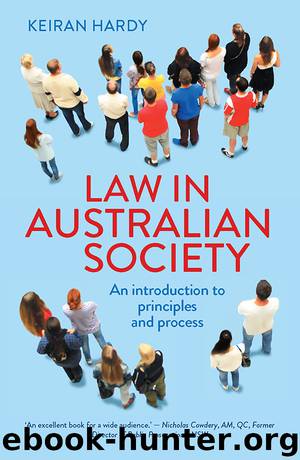Law in Australian Society by Keiran Hardy

Author:Keiran Hardy
Language: eng
Format: epub
Publisher: Allen & Unwin
Published: 2019-06-03T16:00:00+00:00
Paternalistic offences offences, like those for unregulated gambling and prostitution, that target conduct more directly for moral reasons
You can see that there is overlap in these three ideas: a crime will not fit neatly into any one of these categories. Drugs can harm a person, they can have a wider impact on society, and you could argue that taking them is morally wrong because they artificially alter our bodies (some major religions believe this). Murder harms an individual victim, it impacts on our society, and it is contrary to our beliefs and values.
The three ideas also do not help us determine why some harmful conduct is not considered criminal. Alcohol-fuelled violence remains a major concern for governments and the criminal justice system, but it is legal for adults over the age of eighteen to purchase and drink alcohol. It is also known that cigarette smoking causes lung cancer, but governments have chosen to use taxation, education and advertising campaigns to address the problem, rather than making it illegal to purchase tobacco. Decisions as to whether harmful conduct will be prohibited, permitted or regulated are often complex and involve competing interests across governments, corporations and the wider community.
These three ways to define crime are simply different lenses for thinking about what a crime is and why governments punish people for doing things. They raise questions that are particularly useful when a government proposes to create a new crime through legislation. When a new crime is proposed in parliament, you can ask: should this conduct be a crime? First, does it harm a person? Second, does it harm society? Third, is it morally wrong? If the answer is yes to any of these, how much punishment does it deserve?
Because criminal laws are enacted by parliaments, decisions as to what becomes a crime can be heavily influenced by politics and the media. This interaction is described well by Nicholas Cowdery AM QC, a former Director of Public Prosecutions for New South Wales. Sometimes the lawmaking process works very well, but at other times it can be too heavily influenced by politics or media reporting.
Crimes are created by politicians—they legislate to proscribe certain conduct and to create penalties for breach of those proscriptions. The process by which that is done can be sound, aided by thorough research and expert input and evaluation; or it can be deeply unsatisfactory, depending as it may upon the political priorities and perceived urgency of the legislators and their assessment of what we deserve, often filtered through the tabloid media. (Cowdery 2014: 1)
Download
This site does not store any files on its server. We only index and link to content provided by other sites. Please contact the content providers to delete copyright contents if any and email us, we'll remove relevant links or contents immediately.
The Borden Murders by Sarah Miller(4325)
The Secret Barrister by The Secret Barrister(3708)
Police Exams Prep 2018-2019 by Kaplan Test Prep(2546)
Coroner's Journal by Louis Cataldie(2477)
The Splendid and the Vile by Erik Larson(2472)
Terrorist Cop by Mordecai Dzikansky & ROBERT SLATER(2078)
A Colony in a Nation by Chris Hayes(1934)
My Dark Places by James Ellroy(1931)
The Art of Flight by unknow(1878)
Black Klansman by Ron Stallworth(1793)
Objection! by Nancy Grace(1782)
A Life of Crime by Harry Ognall(1729)
The New Jim Crow by Michelle Alexander(1702)
Anatomy of Injustice by Raymond Bonner(1668)
American Prison by Shane Bauer(1658)
Invisible Women by Caroline Criado Perez;(1642)
Whoever Fights Monsters by Robert K. Ressler(1616)
Obsession (The Volkov Mafia Series Book 1) by S.E Foster(1578)
A is for Arsenic: The Poisons of Agatha Christie (Bloomsbury Sigma) by Kathryn Harkup(1548)
